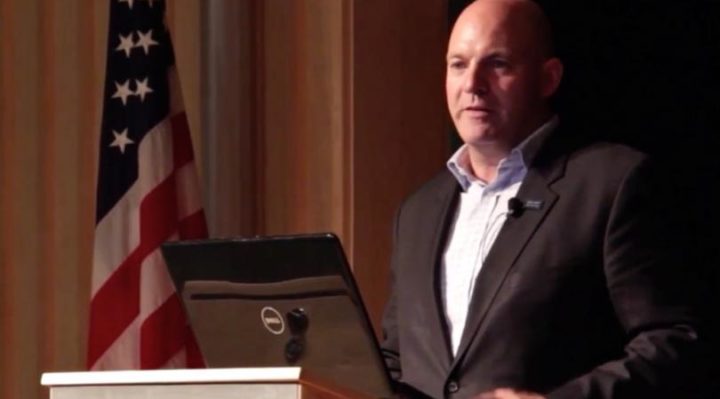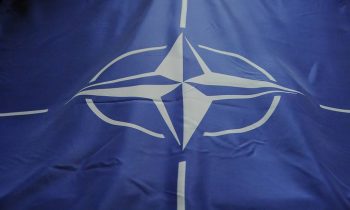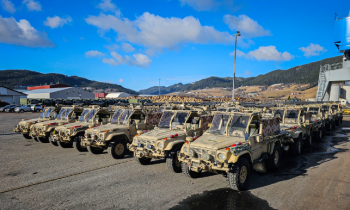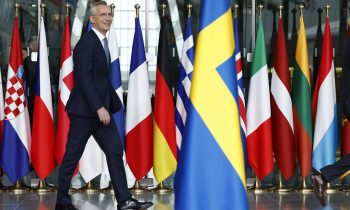“Counterterrorism is a very good example of where Washington and Moscow are working together. This is very much a shared interest and a shared concern for all states, not just NATO states, but all states within the framework of the United Nations as we want to make sure that our institutions are not threatened and our people are not threatened. We have worked with Russia to be able to identify threat networks and disrupt those threat networks, and that is certainly an amenable space that Moscow values, that Washington values ” explained Assistant Secretary Clarke Cooper of the Bureau of Political-Military Affairs on a call with reporters.
What would be useful is for the permanent representative from Russia to not be always disruptive or vetoing the work of the UN Security Council, and not take a coercive posture. I would say if one is looking at it from the United Nations or if one is looking at it from the perspective of the Security Council, the P5 dialogue is there. Take advantage of the institution, and the mechanisms that already exist and don’t seek to divide or bifurcate what is already present for a – what could be a fruitful platform for dialogue, he said.

Below is a full rush transcript of the press conference by Assistant Secretary Clarke Cooper Bureau of Political-Military Affairs
Assistant Secretary Cooper: Many look at the Munich Security Conference as something that is tied or tethered to our history, and it is, but we’re looking forward. And so – and the aspect of what is past is prologue, we are looking at the future of the alliance.
One thing that hasn’t changed that is still relevant to the future alliance is that – states being able to protect their citizens to be able to deter threats, but also to be best ready and best available and have the full capacities to work with each other, be interoperable. And when we look at a world where threats aren’t restricted to one particular geographic region, they are transregional, it is probably best for us to be not just pragmatic but forward-leaning on how to address transregional threats in a way that keeps them mitigated far afield from our homes, our families, and from our interests.
Question: What was the content of the meeting today between Secretary Pompeo and Russian Minister Lavrov? Did they discuss events around Idlib in Syria, and are there any plans of talks on the New Start Treaty, which expires in a year?”
Assistant Secretary Cooper: I’m not going to be able to give a readout between Secretary Pompeo and Foreign Minister Lavrov. But there are certainly shared interests. I just had mentioned that threats can be transregional and do not respect geopolitical borders. Counterterrorism is a very good example of where Washington and Moscow are working together. This is very much a shared interest and a shared concern for all states, not just NATO states, but all states within the framework of the United Nations as we want to make sure that our institutions are not threatened and our people are not threatened. We have worked with Russia to be able to identify threat networks and disrupt those threat networks, and that is certainly an amenable space that Moscow values, that Washington values.
Safe to say, though, that there remain challenges. I mentioned institutions. We look at Moscow to make sure that they understand they should not be disrupting institutions. I would imagine that there is still room for honest, frank discussions to tell Russia to not impede upon free and open elections, not only in the United States, but not impede upon free and open elections globally, and that those kind of information operations or disruptive operations certainly benefit no one other than those who may be taking an adversarial standpoint. So if we look at the scope of what could have been discussed today, there’s definitely room where we have been cooperative to counter terror threats to our populations, and there’s also room to have actually probably had an honest conversation about leaving alone free and open elections in the world.
Question: Will there be any change in U.S. security policy and strategy in Eastern and Central Europe due to the upcoming elections? Are there any U.S. suggestions on how to address the European migrant crisis?”
Assistant Secretary Cooper: I’ll start with policy. The national security strategy, as set by the Trump administration, focuses on making sure from a global power competition standpoint that we are addressing adversarial actions or adversarial actors not only to U.S. national security, but also to our partners’ national security interests. With that requires the need to address readiness and interoperability with states, regardless if they’re a NATO state or an EU state.
What does that mean for Central and Eastern Europe? It means that we do have to address things like physical capacities to ensure that sovereignty is maintained. And we also need to be building a capacity on resilience to ensure that any kind of disruptive activities coming from a place like Moscow are not incurring upon or weakening democratic institutions. So there is no change in that sense.
What I would offer is that not only in 2020 but in beyond is there is a very deeply rooted investment in the United States, not only in the executive branch, but also in our Congress, in the legislative branch, to build resilient institutions, and to ensure that there is not only readiness from a military standpoint, but readiness from a civil society standpoint to ensure that we don’t have what we value turned against us. And there is certainly evidence of that in other election cycles, and we are certainly cognizant of that risk remains out there, and we would like to make sure that our friends and allies are eyes wide open. So while we may not be able to prevent those adversarial activities or those disruptive activities, we can be aware of them and we can mitigate risk.
As to migration, I would offer that one thing that hasn’t changed and has crossed administrations is our commitment to the 1951 Convention on Refugees. There is certainly recognition, and it’s incumbent upon states to know that if there is someone in true refugee status in extremis that is very much different from mixed migration and those legal requirements that are associated with mixed migration.
We also are very pragmatic as to how mixed migration may be used or abused by facilitators associated with terror networks or illicit trafficking. But that is why sovereign states have migration protocols, and why sovereign states have legal migration mechanisms that allow for mixed migration. But we should not confuse someone’s true extremis refugee status as something that is not to be addressed because there are people who are truly fleeing for their lives. But legal migration and recognition of the sovereignty of neighboring states certainly factors across the board regardless of administration.
Question: Which further steps is the U.S. Government planning to take in order to encourage Turkey to buy the Patriot SAM System and the F-35 instead of Russia’s S-400 and SU-35? Which steps would we have to – have to expect should these steps prove unsuccessful and Turkey deploys the S-400?”
Assistant Secretary Cooper: Right. So to catch people up, many are clearly aware, as is the Der Spiegel correspondent is, is that Turkey is seeking to acquire the S-400 air defense system from Russia. Why is that a problem? There is an interoperability problem from a practical measure of having to integrate these significant systems. It is not NATO-compatible. That’s a problem. It also encourages risk upon other NATO-compatible elements. What did we have to do as an alliance when the United States took this first measure was we had to remove Turkey from the F-35 Joint Strike Fighter Program and essentially compartmentalize them for now. It’s not permanent, and Turkey knows this.
If they’re able to reconcile their air defense systems, be it with the acquisition of the Patriot, which is NATO-compatible, or with some other integrated air defense program, we could find ourselves in a situation where the Joint 30 – the Joint – F-35 Joint Strike Fighter could be reintroduced to Turkey. But for now, we’ve actually had to cleave Turkey away from the Joint Strike Fighter Program and actually put them in a place where they are anathema to this very significant part of interoperability amongst NATO member states.
What else is at risk? Well, if they continue to go down the path of acquiring significant Russian systems, be it an air defense system like the S-400 or be it an air jet fighter platform like Sukhoi F-35, they are at risk at further isolation and they are also at risk of sanctions. So a sanctions regime is certainly still on the table. The United States has a number of sanction considerations for them, and it’s important for our partners in Ankara to appreciate is that just because sanctions haven’t been issued to date does not mean they will not be issued.
So there is certainly room to course-correct. There is room to reconcile. But the longer this is protracted, the greater they’re at risk of cleaving or extracting further parts of the relationship. That said, we are working very hard to maintain the bilateral relationship on a military-to-military basis, and we’re working very hard to maintain that relationship as an alliance as well.
Question: Does President Putin’s idea of a summit between leaders of the P5 UN Security Council members seem useful?”
Assistant Secretary Cooper: Well, there’s always a line of communication through the national – I mean, through the UN Security Council. The dialogue is there. What would be useful is for the permanent representative from Russia to not be always disruptive or vetoing the work of the UN Security Council, and not take a coercive posture. I would say if one is looking at it from the United Nations or if one is looking at it from the perspective of the Security Council, the P5 dialogue is there. Take advantage of the institution, and the mechanisms that already exist and don’t seek to divide or bifurcate what is already present for a – what could be a fruitful platform for dialogue.
Question: How far is the U.S. willing to go in its help with – for Turkey and Syria? Will we witness a new level of escalation in Idlib?”
Assistant Secretary Cooper: Well, Idlib is not just an escalation with states. I mean, part of the challenge in Idlib is also the significant number of non-state actors, the long, growing list of enumerated violent extremist organizations, some associated with regime change for Syria, some not even associated with any kind of a development of any particular state. What we would push for, as we have, is for resolution and reconciliation in that space, but not at the risk or not at the reduction of populations.
And what do I mean by that? Is we certainly don’t want to see the Kurdish population to be in a position where they are falling victim to the overlapping layers of battles that are occurring in that space for certain amounts of sovereignty, as well as the battles are taking place to regain areas that had been lost to what was then under the control of ISIS or Daesh. This is concerning the shared burden, essentially, that Turkey would appreciate that the regime in Damascus would appreciate, and other populations would appreciate, is that without reconciling that space, there is the opportunity for growth or resurgence of ISIS.
There is certainly the more internecine or the more conflict amongst state actors and those entities there that are seeking to find peace in that space – the more there’s conflict in those parties, the more opportunities provided for ISIS to reemerge in a posture that had already been degraded because of our joint counterterrorism efforts. So again, if we’re not careful, we will find ourselves back where we were before, several years ago, and that is a risk I don’t think anybody in any capital would like to see reemerge. And the only ones who would benefit from that would be your terrorists.
Question: 5G is a dominating topic at the Munich Security Conference. What is the State Department’s role as partners and allies like the U.K. consider granting some – if the State Department – if U.S. partners and allies consider granting some access to Huawei?”
Assistant Secretary Cooper: Right. The important – the important aspect on 5G technology is making sure that partners, regardless if they’re in the NATO alliance or if they’re in any other kind of membership status, is being fully cognizant of the risks they’re about to incur. If one looks at telecommunication systems as ecosystems, the question that needs to be asked is: What is being introduced in a state’s communications or telecommunications ecosystem?
And we would offer, if one looks at the posture of Huawei, and we look at the posture of China, and how they’ve applied, and through coercion, particular tools, that risk is very high. If we’re looking at how we share information, who we share information with, and what their role may be in either a shared defense or shared readiness, that certainly factors. Understandably, some states in the European Union may not have the full capacity to fully assess and fully take into account what those risks are to either their government institutions or their financial institutions or any of their industry institutions.
What we’re highlighting is the risks of exploitation and the risks of theft of either unique intellectual property, intelligence, or significant government data. How can we help? If a state has certain capacity issues, this is where a number of states are looking to commit, if not equities, then resources to protect them. But I would say if a state is – thinks that they can simply compartmentalize Huawei and keep it compartmentalized away from their official communications or their intelligence communications or their military or defense communications, they need to look very carefully and think twice. Because the risk is real, and it’s not that this is theoretical.
There is precedence for this. All one has to look, is to see what China has done externally without telecommunications access. If one looks at incursions upon commercial sites for data mining, the Marriott Hotel system, Experian credit, online services in the U.S. government, the incursions upon our Office of Personnel Management, on that data – all those exploitive activities occurred without invitational access to these platforms and systems.
And so again, to our friends, to our partners and our allies, we said, please, buyer beware. Caveat emptor as to what you’re looking at because it may be harder to address after the fact. Better to take an open-eyed view and at least address mitigating measures on the front end than trying to correct them on the back end.
Assistant Secretary Cooper: Again, thrilled to be in Munich, and just to offer that our time here is forward-looking. Earlier we were talking about the posture of violent extremist organizations and terrorist entities, not just in Syria, but the external operations threat and the transregional threat. And now the time is right for NATO states and EU states to look beyond their own sovereign borders and look beyond Europe as to where they can provide further capabilities and further resources for partners in places like North Africa and like the Middle East to make them stronger and more capable, and appreciate that mutual benefit, not only for those partners in those locations, but for a furthering of security for Europe.



